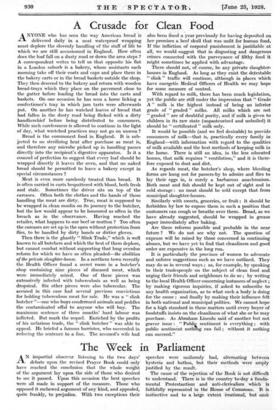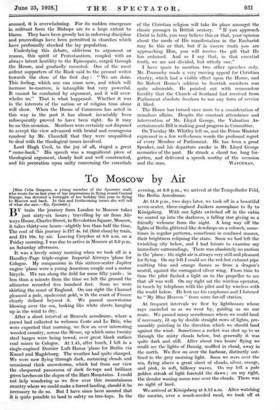The Week in Parliament A Nimpartial observer listening to the two
days' debate upon the revised Prayer Book could only have reached the conclusion that the whole weight of the argument lay upon the side of those who desired to see it passed. Upon this occasion the best speeches were all made in support of the measure. Those who opposed it eschewed argument of any kind, and appealed, quite frankly, to prejudice. With two exceptions their speeches were uniformly bad, alternating between hysteria and bathos, but their methods were amply justified by the result.
The cause of the rejection of the Book is not difficult to undeistand: There is in the country to-day a funda- mental Protestantism and anti-clericalism which is faithfiilly represented in the House of Commons. It is instinctive and to a large -extent irrational; but once aroused, it is overwhelming. For its sudden emergence in militant form the Bishops are to a large extent to blame. They have been grossly lax in enforcing discipline and proceedings have been permitted in churches which have profoundly shocked the lay population.
Underlying this debate, oblivious to argument or reason, this spirit of Protestantism, coupled with an always latent hostility to the Episcopate, surged through the House, and gradually mounted. One of the most ardent supporters of the Book said to the present writer towards the close of the first day : " We are done. This feeling, which one can sense now, and which will increase to-morrow, is intangible but very powerful. It cannot be combated by argument, and it will over- whelm us." That is what happened. Whether it was in the interests of the nation or of religion time alone will- show. When the House of Commons has acted in this way in the past it has almost invariably been subsequently proved to have been right: So it may be on this occasion. Members were certainly not disposed to accept the view advanced with brutal and courageous candour by Mr. Churchill that they were unqualified to deal with the theological issues involved.
Lord Hugh Cecil, to the joy of all, staged a great " come-back." His speech was a magnificent piece of theological argument, closely knit and well constructed, and his peroration upon unity concerning the essentials of the Christian religion will take its place amongst the classic passages in British oratory. " If you approach Christ in faith, you may believe this or that, your opinion about the mode of His manifestation in the Eucharist may be this or that, but if in sincere truth you are approaching Him, you will receive the gift that He has ordained. And so I say that, in that essential truth, we are not divided, but utterly one."
I have space to mention two other speeches only. Mr. Ponsonby made a very moving appeal for Christian charity, which had a visible effect upon the House, and Sir Robert Home's address to Scottish members was quite admirable. He pointed out with remorseless lucidity that the Church of Scotland had received from Parliament absolute freedom to use any form of service it liked.
The House has turned once more to a consideration of mundane affairs. Despite the constant attendance and intervention of Mr. Lloyd George, the Valuation As- certainments Bill is making good progress in Committee.
On Tuesday Mr. Whitley left us, and the Prime Minister expressed in a few well-chosen words the profound regret of every Member of Parliament. lie has been a great Speaker, and his departure awoke in Mr. Lloyd George memories of the past. He struck a chord too long for- gotten, and delivered a speech worthy of the occasion































 Previous page
Previous page